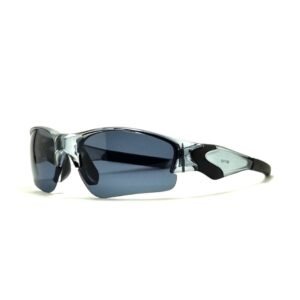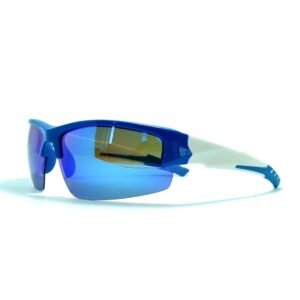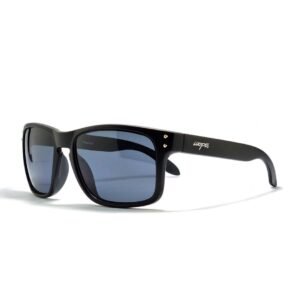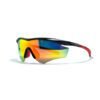MEASUREMENTS -VK1006 kids(5-12 years)
Lens Height @3.0cm
Lens Width @5.0cm
Frame Width @11.6cm
Made of flexible and bendable lightweight frame material for children’s safety.
It is important to choose the right lens color for your activity and environment. Each lens color has different functionality and your choice of the lens color affect how much light reaches your eyes.
Grey Lens
Grey lens helps to sharpen colors and transmit all objects colors evenly and provide near-natural vision. It is largely use for daily activities and also deep water fishing as it helps to enhance your vision of the fish through the water.
Brown Lens
Good for a wide variety of light conditions, helps cut down on blue rays and a comfortable color to wear. This lens color is great for driving as it helps to enhance your view of the road and good for shallow-water fishing as it improves contrast and depth perception. Light brown lenses is good for overcast days and recommended for golfers too.
Green Lens
Good for varying light conditions and a popular color choice for golf, tennis, driving and quite an all-purpose color as it has minimum color distortions and maintains true color. A great choice especially for tennis/golf players because the color brings out the background of the environment and enhance the contrast with the yellow ball. It is also the great choice for activities in the greeneries. The human eye is comfortable with green and works well with it.
Mirror or Revo Lens
Mirror lens have a reflective film applied to the exterior surfaces of the lenses and reduce glare by reflecting the light that hits its lens surface. Darker mirror coatings may makes objects appear darker than they are. This lens colors also transmit all objects colors evenly and provide near-natural vision. They are largely use for outdoor activities.
Yellow Lens / Amber Lens / Orange Lens
Good for hazy, overcast, foggy or cloudy days (moderate to low level light conditions). Also good for outdoor activities at dawn or dusk as these lens colors have the maximum light transmission and will make everything seem brighter. They are commonly used by golfers, shooters and hunters during moderate to low level light conditions for their contrast enhancement and excellent depth perception. Shooting glasses are usually yellow as it makes the targets more visible. Yellow lens is suitable for night driving and cycling.
KACHI GLOBAL PTE LTD has been established since 2002, its portfolio includes proprietary brands such as XLOOP®, EAGFE®, LOOPES®, as well as wholesale distribution network to Malaysia, Brunei, Australia and USA. And is complemented by an extensive retail network at approx. 600 stores island-wide in Singapore with Caltex, Esso, Shell, SPC, Cheers Convenience Stores, Lifestylemart @Safra Punggol, Yishun and The Chevrons. As well as selected Fishing Tackle Shops, Optical Shops and Eye Care Clinic.
LOOPES® is well positioned to serve every segment of market. Our winning edge is that all our products are CE approved (Europe Standard) and we produce a wide range of quality sunglasses, available in full range color assortments and designs.
POLARIZED LENSES
All of our sunglasses are made from triacetate cellulose (TAC) – contained of 7 layers. 1st is a polarizing layer that provides more than 100% polarization that absorbs glare. 2nd & 3rd allow durability that resists harsh environments. Follow by, the UV absorbing layers that absorb over 99% ultraviolet rays. Lastly, the shock proof layers that increase impact and scratch resistance. With these 7 layers, it blocks more than 99% of harmful UV rays with wavelengths up to 400 nanometers.
Polycarbonate (PC) is a thermoplastic, and is the most commonly used material in the safety eyewear industry. It is an incredibly useful plastic for applications requiring transparency and it possesses excellent impact resistance, and it also inherently blocks 99.9% of UVA/UVB rays.
WILL SALTY SWEAT AND SALT WATER DAMAGE YOUR LENSES? HOW TO PROTECT ANTI-REFLECTIVE COATING?
Sweat & Salt water can cause serious damage to any sunglass lens. The ions in salt water can accelerate the decomposition time of many metals, finishes and varnishes. The combination of moisture, oxygen and salt from the water is actually even more dangerous than rust, as it can corrode and weaken metal 5 times faster than regular water, causing the lenses to fall apart. It is important to keep in mind that different models and coatings react differently to salt water.
Aside from the ions in salt water causing the coatings to peel, the salt and sand found in water could also cause small scratches and cracks in your lenses. If salt gets on your lenses and dries down, it could scratch the lenses, causing irreversible damage.
The best way to take care of the coating is after outdoor exercise, use clean water to wash it and use microfiber soft cloth or pouch to dry it. NEVER use tissue or shirt to clean the lens.




























Reviews
There are no reviews yet.